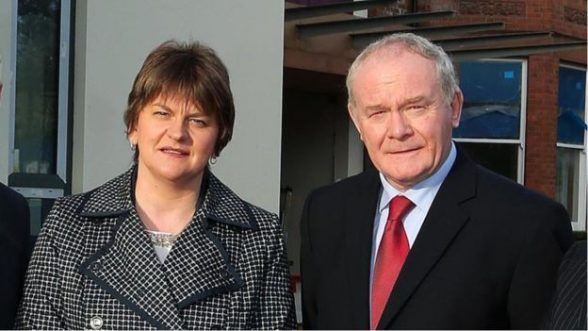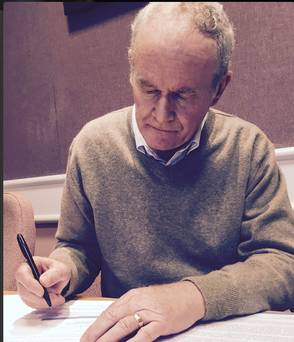
MARLENE IS FINISHED…Martin McGuinness falls out with Arlene Foster over her refusal to step aside over£490 million’cash-for-ash’ scandal
OUTGOING and out-manoeuvred First Minister Arlene Foster has warned that if an election goes ahead, it will be “brutal”.
Arlene Foster was speaking after the Secretary of State said the “clock was ticking” on an election after Sinn Fein Foyle MLA Martin McGuinness quit as deputy first minster on Monday over the £490 million ‘cash for ash’ scandal.
Secretary of State James Brokenshire said the grave situation made an assembly election look “highly likely”.
Under the North’s power-sharing agreement, Mrs Foster loses her role with Mr McGuinness’ departure.
Speaking at a press conference at her party’s headquarters in east Belfast today, the DUP leader said: “I have no doubt that if the election proceeds it will be a brutal election, it will be a very difficult election.”
She said she had been “disgracefully maligned in a most vicious manner” in the scandal surrounding the Renewable Heat Incentive (RHI) scheme – which could cost NI taxpayers £490m.
Mrs Foster set up the RHI scheme in 2012 when she was enterprise minister, in an attempt by the NI Executive to increase consumption of heat from renewable sources.
But businesses received more in subsidies than they paid for fuel, and the scheme became heavily oversubscribed.
The debacle has held centre stage in politics in Northern Ireland over the past month, with Mrs Foster facing repeated calls to resign but she has rejected them.
However, she said there was still room for optimism, as an inquiry into the flawed scheme could get under way by the end of the week under the 2005 Inquiries Act.
“It is of the utmost importance that the truth comes out,” she said.
In a week’s time, Northern Ireland Secretary James Brokenshire will have the power to set a date for a new election which is likely to be in early March.
Both the British and Irish governments have urged Sinn Féin and the DUP to enter talks to resolve the dispute, and Mrs Foster said she was open to such a discussion.
Mr McGuinness said he wanted to “call a halt to the DUP’s arrogance”.
Sinn Féin have not disclosed details of his recent illness.
Mr McGuinness denied that the decision had anything to do with health problems.
Mrs Foster said she was disappointed by his resignation, which she said was “not principled”.
Mr Brokenshire told the House of Commons that both Westminster and the Irish government would “continue to provide every possible support and assistance to the executive parties”.
“We do, however, have to be realistic. The clock is ticking,” he said.
“If there is no resolution, then an election is inevitable despite the widely held view that this election may deepen divisions and threaten the continuity of the devolved institutions.”
Mr Brokenshire said the RHI scandal was an “entirely devolved matter” for the Northern Ireland Assembly.
However, he said it was imperative that a “comprehensive, transparent and impartial inquiry” be established as soon as possible.
Earlier, DUP MP Jeffrey Donaldson said he was unsure whether power sharing could be restored in Northern Ireland, even after an election.
He told RTÉ he was “not convinced” that a coalition government could be formed in the next few months, and that an election would not resolve the issues.
Sinn Féin’s Máirtín Ó Muilleoir said that power-sharing could be restored if “the DUP commit to the principles of the Good Friday Agreement”.
“We will never rebuild credibility in these institutions unless we commit again to the promise, to the principles and to the parity of esteem that is at the very foundation and root of the Good Friday Agreement,” he said.
He accused the DUP of “trampling” on the agreement.
Tags:





